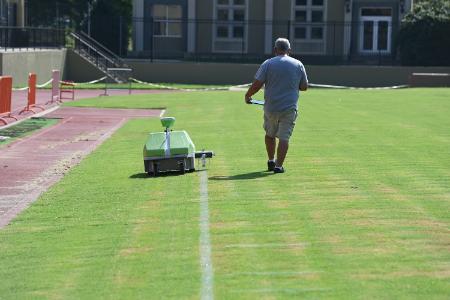Upgraded Athletic Fields Ready for Keydet Play

Willy Lilly walks beside Carl, as it paints lines on Alumni Memorial Field at Foster Stadium. –VMI Photo by Kelly Nye.

LEXINGTON, Va. Aug. 14, 2024 — The Keydet football and soccer teams at VMI will be playing on newly sodded fields this year. Alumni Memorial Field at Foster Stadium and Patchin Field were both sodded over the summer with Tahoma 31 Bermuda grass, known for its exceptional tolerance to cool temperatures, as well as wear and tear, making it an ideal choice for athletic fields, and enhancing the gameplay of high-intensity sports.
Eric Schwartz ’95, deputy director of the Department of Facilities Management, also known as physical plant or P2, stated that with the new sod’s improved cold tolerance, VMI is considering skipping the usual overseeding of the football field this fall. “Typically, this process involves spreading hundreds of pounds of ryegrass seed to keep the field green throughout the entire football season, followed by spraying out the rye in the spring. However, the new sod remains active at soil temperatures down to 55 degrees. Since our average soil temperatures range from 45 to 55 degrees in November, even if the Tahoma 31 goes dormant and turns brown, it will still retain its playability characteristics.”
Before laying down the new sod, the fields were meticulously prepped through a multi-step process. The old turf was stripped using a technique called fraise mowing. Then, the fields were reverse tine tilled to improve soil structure and aeration. Finally, the surfaces were laser leveled to ensure a perfectly even playing surface.
According to Schwartz, natural grass turf is typically replaced every three to five years on heavily used fields.
“At VMI, the sod at Foster Stadium underwent significant repairs in 2005, and Patchin Field saw major repairs in 2009, but a full sod on each field predates this. The grounds shop at VMI extended the life of the old sod for many years through diligent maintenance and strategic repairs, demonstrating their dedication to maintaining excellent playing conditions,” he said.
The field lines and markings on the fields were done by the department’s robotic field painter, Carl, affectionately named after an inept character from an insurance commercial, who while daydreaming, makes a shambles of drawing base lines on a baseball diamond with a line chalker. In contrast, Carl the robot came with dimensions prepackaged in its software, and ensures precise and consistent field markings while saving labor, reducing paint requirements, and cutting costs.
Schwartz shared that Carl can paint a soccer field in 45 minutes and a football field in a few hours, compared to the several hours and three days required, respectively, when done manually.
“Carl also painted the VMI spider in the center of the football field. The precision of Carl’s work is significantly higher than traditional methods, resulting in a more professional appearance. The time savings has allowed us to add unique touches to the football field, such as the end zone lettering of ‘Keydets.’”
In addition to football and soccer, Carl paints the rugby field, and painted the baseball field before it was upgraded to synthetic turf. Carl uses a GPS antenna for accuracy within a few millimeters. “That is how we can paint over the same field without any ghosting of the old paint," Schwartz said.
“We are excited to showcase the enhanced athletic facilities, and P2’s efforts reflect VMI’s dedication in providing a superior environment for cadets, ensuring they have the resources and support needed to excel both on and off the field,” he added.
Marianne Hause
Communications & Marketing
VIRGINIA MILITARY INSTITUTE
.svg)
.png)